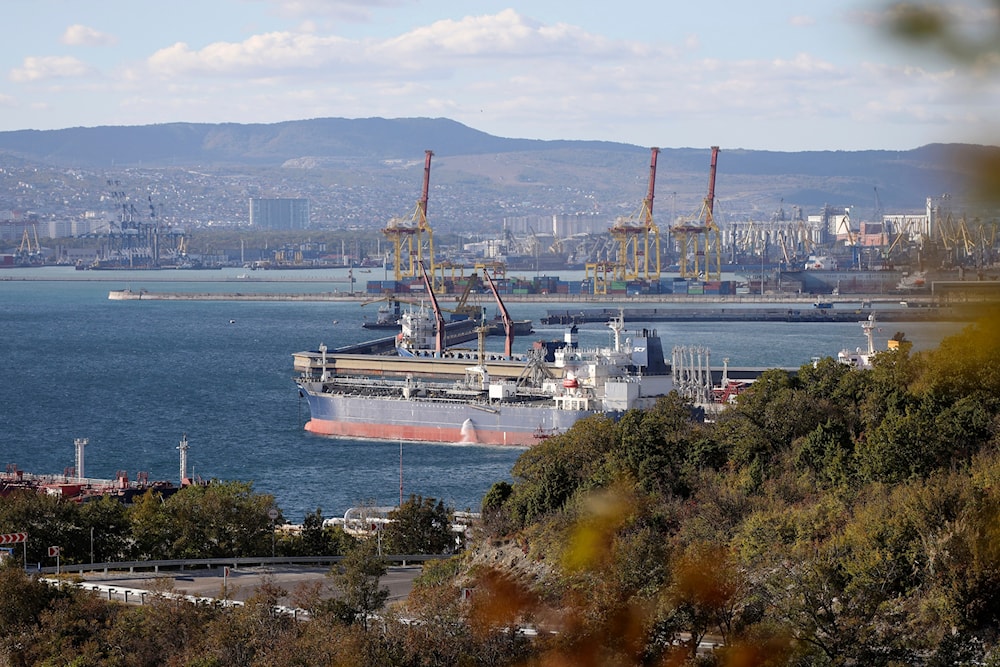EU spent more on Russian oil, gas than Ukraine aid, report finds
The report by the Centre for Research on Energy and Clean Air found that the EU spent over 21.9 billion euros on Russian fossil fuels, while it set aside 18.7 billion euros as financial aid for Ukraine.
-

An oil tanker is moored at the Sheskharis complex, part of Chernomortransneft JSC, a subsidiary of Transneft PJSC, in Novorossiysk, Russia, on Oct. 11, 2022 (AP)
The European Union spends more money on oil and gas from Russia than it spends on financial aid to Ukraine, a report published by the Centre for Research on Energy and Clean Air (Crea) on Sunday revealed.
The report marking the third anniversary of the war in Ukraine has found that the EU spent around 23 billion dollars on Russian oil and gas in the third year of the Russo-Ukraine war, despite attempts by Europe to reduce its reliance on Russian energy imports to avoid aiding it. Meanwhile, Ukraine received around 19.6 billion dollars in financial aid, according to the Kiel Institute for the World Economy.
"Purchasing Russian fossil fuels is, quite plainly, akin to sending financial aid to the Kremlin and enabling its invasion. [It’s] a practice that must stop immediately to secure not just Ukraine’s future, but also Europe’s energy security," said Vaibhav Raghunandan, co-author of the report and analyst at Crea.
In 2024, the European Union spent 39% more on Russian fuel imports than it set aside for Ukraine, excluding military or humanitarian contributions, and the report highlights that Moscow earned 253.6 billion dollars from its global fossil fuel exports, with its revenues since the start of the war inching closer to the trillion dollar figure.
Crea adds that Russia gets up to half of its tax revenues from the oil and gas sectors and is bypassing sanctions by transporting fuel on a "shadow fleet" of old, underinsured tankers, responsible for one-third of its fossil fuel revenues.
Russian fossil fuel revenues could be diminished by 20%, according to the report, by escalating existing sanctions and resolving loopholes, including a refining loophole that Europe can use to buy Russian crude oil that is processed in another country, and restricting gas flow through the Turkstream pipeline.
EU and Russia's complicated relationship
The Council of the European Union approved its 16th sanctions package against Russia on February 24, adding 48 individuals and 35 organizations to the list, including a ban on offering specialized financial messaging services to 13 regional banks considered essential to Russia's financial and banking systems.
Russia expressed its readiness to supply gas to Europe, either via Ukraine or the remaining Nord Stream pipeline, while such deliveries entirely rely on the buyers, according to the head of the Russian Foreign Ministry's Department of Economic Cooperation Dmitry Birichevsky.
"We can see that [interaction with Russia] is important for Western economic operators and the signals we get from them prove this." Birichevsky stated to RIA Novosti, adding that they "hope that we will be able to develop an effective format of interaction with them."
European officials previously debated the possible resumption of Russian pipeline gas sales to the EU as part of a potential deal to end the war in Ukraine, according to the Financial Times, with supporters of the initiative arguing that Russian gas imports could lower energy prices, while opposition came from Ukraine's closest allies in the EU.
Prior to the Russo-Ukraine war, Russian pipeline gas accounted for over 40% of Europe's supply, and restarting those imports will undermine the efforts of European leaders to phase out Russian fossil fuels.
The EU's energy chief Dan Jorgensen made it a "main priority" to develop a plan that would sever the Union's energy ties with Russia, according to Politico, noting that the European Union's increased imports of liquefied natural gas significantly hinder this goal.

 4 Min Read
4 Min Read











